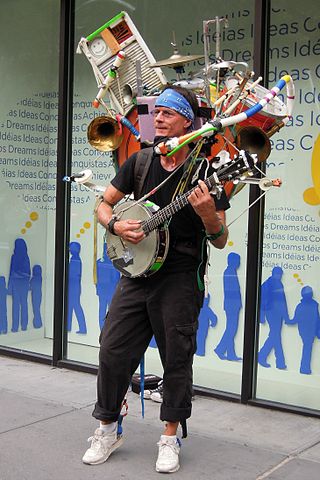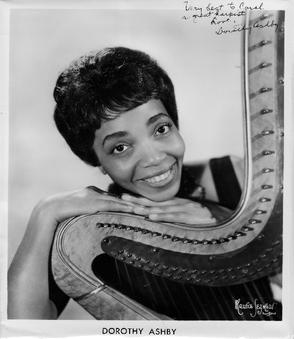
The double bass, also known simply as the bass, is the largest and lowest-pitched bowed string instrument in the modern symphony orchestra. Similar in structure to the cello, it has four, although occasionally five, strings.

Music is generally defined as the art of arranging sound to create some combination of form, harmony, melody, rhythm or otherwise expressive content. Exact definitions of music vary considerably around the world, though it is an aspect of all human societies, a cultural universal. While scholars agree that music is defined by a few specific elements, there is no consensus on their precise definitions. The creation of music is commonly divided into musical composition, musical improvisation, and musical performance, though the topic itself extends into academic disciplines, criticism, philosophy, and psychology. Music may be performed or improvised using a vast range of instruments, including the human voice.

Scott Joplin was an American composer and pianist. Because of the fame achieved for his ragtime compositions, he was dubbed the "King of Ragtime." During his career, he wrote over 40 original ragtime pieces, one ragtime ballet, and two operas. One of his first and most popular pieces, the Maple Leaf Rag, became the genre's first and most influential hit, later being recognized as the archetypal rag. Joplin considered ragtime to be a form of classical music and largely disdained the practice of ragtime such as that in honky tonk.

Musical composition can refer to an original piece or work of music, either vocal or instrumental, the structure of a musical piece or to the process of creating or writing a new piece of music. People who create new compositions are called composers. Composers of primarily songs are usually called songwriters; with songs, the person who writes lyrics for a song is the lyricist. In many cultures, including Western classical music, the act of composing typically includes the creation of music notation, such as a sheet music "score," which is then performed by the composer or by other musicians. In popular music and traditional music, songwriting may involve the creation of a basic outline of the song, called the lead sheet, which sets out the melody, lyrics and chord progression. In classical music, orchestration is typically done by the composer, but in musical theatre and in pop music, songwriters may hire an arranger to do the orchestration. In some cases, a pop or traditional songwriter may not use written notation at all and instead compose the song in their mind and then play, sing or record it from memory. In jazz and popular music, notable sound recordings by influential performers are given the weight that written or printed scores play in classical music.

A composer is a person who writes music. The term is especially used to indicate composers of Western classical music, or those who are composers by occupation. Many composers are, or were, also skilled performers of music.

Keith Jarrett is an American jazz and classical music pianist and composer. Jarrett started his career with Art Blakey and later moved on to play with Charles Lloyd and Miles Davis. Since the early 1970s, he has also been a group leader and solo performer in jazz, jazz fusion, and classical music. His improvisations draw from the traditions of jazz and other genres, including Western classical music, gospel, blues, and ethnic folk music.

Street performance or busking is the act of performing in public places for gratuities. In many countries, the rewards are generally in the form of money but other gratuities such as food, drink or gifts may be given. Street performance is practiced all over the world and dates back to antiquity. People engaging in this practice are called street performers or buskers in the United Kingdom. Outside of New York, buskers is not a term generally used in American English.

The erhu is a Chinese two-stringed bowed musical instrument, more specifically a spike fiddle, which may also be called a Southern Fiddle, and is sometimes known in the Western world as the Chinese violin or a Chinese two-stringed fiddle.
Mannheim Steamroller is an American neoclassical new-age music group founded by percussionist/composer Chip Davis that is known primarily for its Fresh Aire series of albums, which blend classical music with elements of new age and rock, and for its modern recordings of Christmas music. The group has sold 28 million albums in the U.S. alone.

A guitar solo is a melodic passage, instrumental section, or entire piece of music, pre-written to be played on a classical guitar, electric guitar or an acoustic guitar. In 20th and 21st century traditional music and popular music such as blues, swing, jazz, jazz fusion, rock and metal, guitar solos often contain virtuoso techniques and varying degrees of improvisation. Guitar solos on classical guitar, which are typically written in musical notation, are also used in classical music forms such as chamber music and concertos.

Woody Herman Shaw Jr. was an American jazz trumpeter, flugelhornist, cornetist, composer, arranger, band leader, and educator. Shaw is widely known as one of the most important and influential jazz trumpeters and composers of the twentieth century. He is often credited with revolutionizing the technical and harmonic language of modern jazz trumpet playing, and to this day is regarded by many as one of the major innovators of the instrument. He was an acclaimed virtuoso, mentor, and spokesperson for jazz and worked and recorded alongside many of the leading musicians of his time.
Michael Copley is a British virtuoso flautist and recorder player. He is a professional musician who, as well as playing the recorder and flute, is an exponent of other traditional, early and folk woodwind instruments, most notably the ocarina, an Anglo-Italian development of the ceramic vessel flute.

Dorothy Jeanne Thompson, better known as Dorothy Ashby, was an American jazz harpist, singer and composer. Hailed as one of the most "unjustly under loved jazz greats of the 1950s" and the "most accomplished modern jazz harpist," Ashby established the harp as an improvising jazz instrument, beyond earlier use as a novelty or background orchestral instrument, proving the harp could play bebop as adeptly as the instruments commonly associated with jazz, such as the saxophone or piano.

"The Entertainer" is a 1902 classic piano rag written by Scott Joplin. It was sold first as sheet music, and in the 1910s as piano rolls that would play on player pianos. The first recording was by blues and ragtime musicians the Blue Boys in 1928, played on mandolin and guitar.

Lyrita is a British classical music record label, specializing in the works of British composers.

Classical music generally refers to the art music of the Western world, considered to be distinct from Western folk music or popular music traditions. It is sometimes distinguished as Western classical music, as the term "classical music" also applies to non-Western art music. Classical music is often characterized by formality and complexity in its musical form and harmonic organization, particularly with the use of polyphony. Since at least the ninth century it has been primarily a written tradition, spawning a sophisticated notational system, as well as accompanying literature in analytical, critical, historiographical, musicological and philosophical practices. A foundational component of Western Culture, classical music is frequently seen from the perspective of individual or groups of composers, whose compositions, personalities and beliefs have fundamentally shaped its history.

Richard Allen Harvey is an English composer and musician. Originally of the mediaevalist progressive rock group Gryphon, he is best known now for his film and television soundtracks. He is also known for his guitar concerto Concerto Antico, which was composed for the guitarist John Williams and the London Symphony Orchestra.
Jakob Lindberg is a Swedish lutenist, performing solo, in small and large ensembles, and also directing operas, using instruments of the lute and guitar families. He is known for the first ever recording of the Complete Solo Lute Music of John Dowland as well as for recording music never before recorded, with repertoire dating back to the Renaissance period.

Arion is a French record company and label founded in 1962 by Ariane Segal. The label takes its name from the ancient Greek poet and lyre-player, Arion. In the 1960s and 1970s Arion was seen as one of the most adventurous and innovative independent labels in France with an eclectic catalogue ranging from classical music to ethnic music to jazz. Its strengths were, and remain, rarely performed classical works and ethnic music.
Kung Fu Panda 3 is the soundtrack album to the 2016 film Kung Fu Panda 3, the third instalment in the Kung Fu Panda franchise and the sequel to Kung Fu Panda 2 (2011). The film score is composed by Hans Zimmer, who scored the previous instalments with John Powell, but the latter did not return for the third instalment, thereby Zimmer being credited as the sole composer for the franchise. The album was released by Sony Classical Records on January 29, 2016, to positive critical response.















